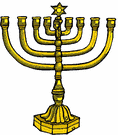The Jewish Calendar
The Jewish Calendar is very different from the Western, or Christian, Calendar. The Jewish Calendar is based on the movements of Earth's Moon. It also has many more years in it than the Western Calendar. The 12 months of the Jewish Calendar are these:
A second month of Adar, Adar II, is sometimes added. Because, like the Islamic Calendar, the Jewish Calendar is based on lunar movements, it has fewer than 365 days in it. In fact, again just like the Islamic Calendar, the Jewish Calendar is 11 days shorter than the Western Calendar every single year. This explains why the major holidays like Rosh Hashanah and Purim are not on the same day every "year." It depends on which calendar you're looking at. In most Western countries, the Western calendar is used, so because the dates don't match up, Yom Kippur moves around. (The same thing can be said of Easter, a Christian holiday that is based on lunar movements and is in either March of April ever year.) Confusion reigned in ancient times as the Israelites struggled to come to terms with their lunar calendar. Eventually, they decided to go to 19-year cycles, adding a month every 3rd, 6th, 8th, 11th, 14th, 17th and 19th years of the cycle. This is how we get Adar II. It is also the way in which the number of days in each month was stabilized. Now, each month has either 29 or 30 days in it. Jews also do not use Christian terms when referring to the Western Calendar. The Western, or Christian, Calendar has B.C. or A.D. after a year in some cases. Since the Christian Calendar is centered on the birth of Jesus, Christianity's central figure, B.C. means "Before Christ" and A.D. means Anno Domini, which is Latin for "In the year of our Lord." Jewish people, on the other hand, uses the terms C.E. (Common Era) and B.C.E. ( Before the Common Era). The Common Era is, of course, the time at which Jews and Christians began to have a shared history.
|
|
Social Studies for Kids
copyright 2002–2026
David White



 Sivan
Sivan
 The Jewish Calendar has more many years in it than the Western Calendar does. For instance, the year 2007 on the Western Calendar is 5767 or 5768 on the Jewish Calendar, depending on the time of year for both. The larger number was determined when scholars added up the years lived by all of the people mentioned in the Torah. Setting aside the obviously longer-than-written-about "seven days" that it took Yahweh to create the world in Jewish tradition, the world was created in 3761 B.C.E.
The Jewish Calendar has more many years in it than the Western Calendar does. For instance, the year 2007 on the Western Calendar is 5767 or 5768 on the Jewish Calendar, depending on the time of year for both. The larger number was determined when scholars added up the years lived by all of the people mentioned in the Torah. Setting aside the obviously longer-than-written-about "seven days" that it took Yahweh to create the world in Jewish tradition, the world was created in 3761 B.C.E. 
